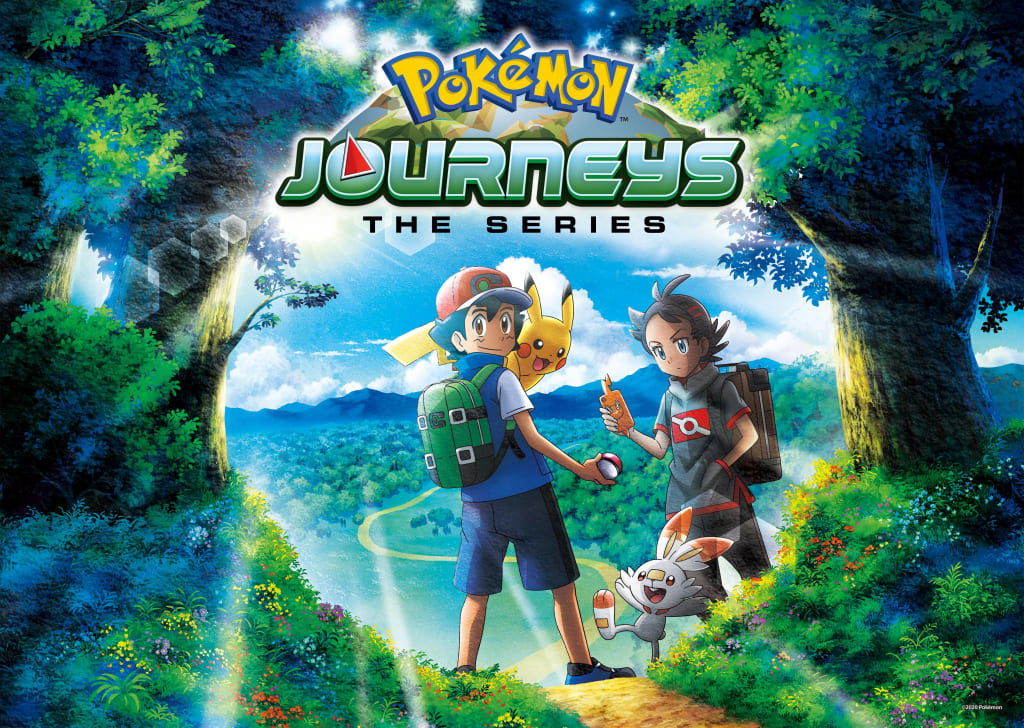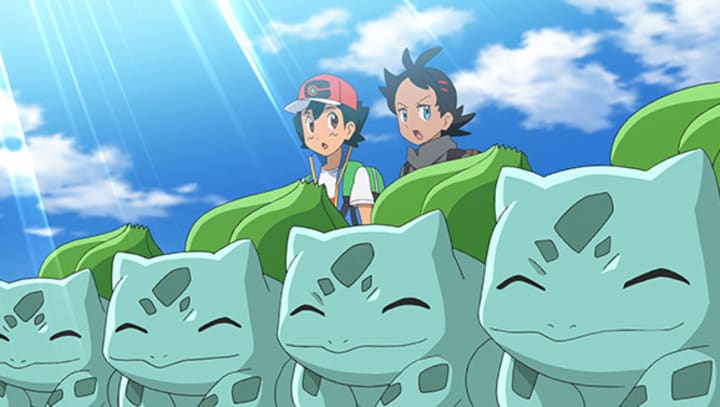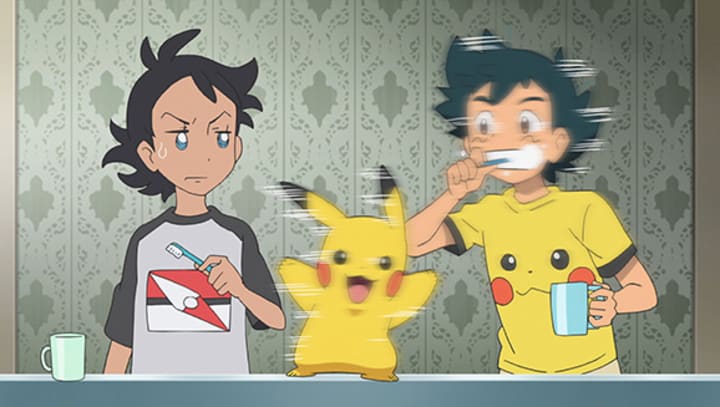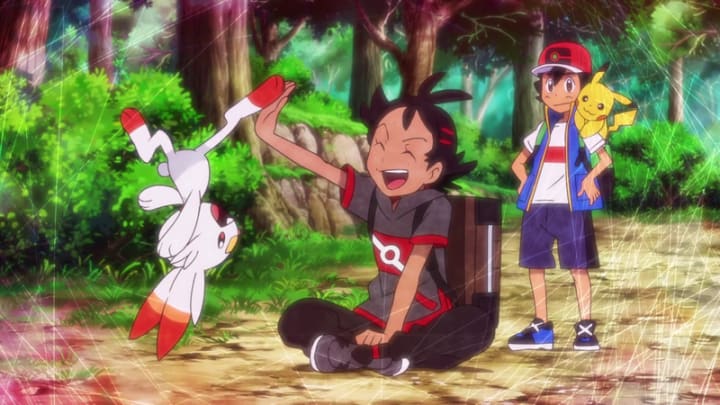How Pokémon Journeys Reflects the Franchise's Fandoms
The newest series' duel protagonists hit very close to home for a fan like me.

I first became a Pokémon fan around 2009, starting my lifelong obsession by playing hours of Platinum version and watching the second half of the Diamond & Pearl anime. The show captured that younger me with how much resemblance the stories bore to the games; it was something I'd never felt before, feeling like I could relate to the characters' struggles that I knew not from my personal life but from a simulated world I'd become fixated on.
I've played almost every main series Pokémon game since then, from Black & White to the current Sword & Shield, but unfortunately I can't say the same for the anime. I stopped watching the Black & White anime about a quarter way through, and although I have enjoyed what little I've seen of X & Y, I just couldn't invest myself enough to see the rest of its run. Putting aside Black & White's disregard for characters' intelligence (No, Ash Ketchum, the Cottonee are not just friends, we keep telling you they want to make babies) and X & Y's persistent romantic subplot (I could care less about any shipping by this point), the anime just started to feel repetitive for me, just "going through the motions" to hit the exact same story beats that past seasons had established: Ash travels with two-to-three companions, usually one male and one female, along a linear journey through the newest Pokémon region, filling his team with Pokémon he's never seen before and fighting gyms as he encounters them. This culminates into a final standoff with the region's evil team, encounters with the region's Legendaries, and long spectacle battles at the Pokémon League, which Ash will inevitably lose because the series can't go on if he wins even one championship, right? Afterwards he says goodbye to his companions, returns home to Pallet Town, and leaves the audience to prepare for his next adventure in the next series. Oh, and Team Rocket's there to cause trouble and provide comic relief too, as usual.
In short, every new series of the anime that I watched felt like a by-the-books, rinse-and-repeat of the story formulas that past seasons had started. While the stories aren't exact copy-pastes of each other, and there is still some significant variation between each region's stories, but I never felt that there was enough to keep me catching each new episode as they came out. Anyone who's watched the series, even if they did enjoy the series' I've described, can understand why I was ready for something new.
Boy, did Sun & Moon deliver on that. Just like the games it's based on, this arc of the anime did away with the formulas and dared to do something completely different with the story. Instead of journeying to each gym with his companions, Ash instead stays in the Alola region with Professor Kukui on Melemele Island and attends the Pokémon School there alongside an ensemble cast of diverse characters, each with unique personalities and fun story arcs. This gave the series a more episodic, slice-of-life feel, and an ensemble cast meant that each subsequent episode could focus on a different teammate's personal journey or backstory to keep the audience from Protagonist Fatigue; even the Pokémon themselves had their own individual arcs, making them feel just as real characters as the human protagonists which I greatly appreciated. Not only that, but every season had its own grander story arc, sprinkled throughout each episode in subtle ways to keep the viewer invested and interested to see the final showdown at the end of the season. Even Team Rocket had something new to bring to the episodes, with their growing bond with a wild Bewear and its family and their own struggles to keep up with TR Headquarters' demands. This kept the series feeling so much more fresh and interesting for me that to this day, it's the only series from the anime that I've watched every single episode of.
And now, so far, it looks like Pokémon Journeys is following this example and going against the formula yet again - except, this time, in a totally different and even meta way.

This time around the story begins back in Kanto - not in the present day, but in a flashback to the very first time Ash was late to Professor Oak's laboratory, when his mom trusted him to wake up in time for Oak's 1-Day Pokémon Camp when he was six. With Ash out of the picture, the audience is then introduced to the series's first secondary protagonist, Goh, who starts out the very opposite of Ash: on-time, studious, and has textbook-knowledge of Pokémon behavior and biology with no problems showing off that knowledge to everyone within earshot. This doesn't make him many friends, but friends seem to be the last thing on his mind when a fateful encounter that day leads him to determine his life goal: catch Mew as his very first Pokémon, before catching every last Pokémon known in the world.
The very next episode felt more familiar to episodes' before, beginning with Ash making his way to Oak's lab yet again for a special conference with newcomer Professor Cerise in Vermillion City, before defying audience expectations yet again by letting Ash and Goh meet through yet another fateful encounter; without spoiling anything, this encounter leads to the two becoming researchers themselves, working and living with Professor Cerise to gather data on all Pokémon throughout every region, setting up the series as an episodic traveling-series that features not just Galar, the most recent region, but every single region up to this point.
Now, I could compare Journeys to Sun & Moon and how their respective formula changes lead to even more interesting stories, but I'm honestly more interested in talking about our so-called dual-protagonists, Ash and Goh.
It really was fascinating watching the first 13 dubbed episodes of Journeys and seeing Ash and Goh's dynamic for the first time. While they were friendly when they met, by the next episode on their first mission together, their personalities begin to clash and they argue until they're each unsure if they could be real "friends" at all. This is interesting because, at their cores, Ash and Goh have almost identical life goals: Ash, of course, wants to be a Pokémon Master, while Goh wants to catch every Pokémon and learn all that he can about them. They both want to become one of the greatest in everything Pokémon-related; it doesn't matter if it's research, filling the PokéDex, or defeating Battle Leagues, if it's to do with the Pokémon themselves, they want to experience it as best and as much as they can.
However, what stops them from understanding this is their differing perspectives and experiences. Ash has traveled through seven whole regions and has caught and-or befriended hundreds of Pokémon by now, including god-like Legendaries like Giratina and even Arceus, had countless near-death experiences from putting his body on the line to protect a Pokémon from danger, and is completely trusting life-partners with his Pikachu; the kid has been through a lot, but he goes along with it with a genuine youthful energy and love for Pokémon that you can't find in any other character in the whole series. The audience has most likely already seen in seasons past how deep his connection with these creatures goes, to the point where it feels like he reads and understands them more than he does people. Goh, on the other hand, has never had this level of experience before, and has instead experienced the world of Pokémon through books and his own research; this, in a way, has limited Goh's experience with Pokémon, as he seems to approach them from a distanced, more scientific perspective. He's never interacted with them the same way Ash has, and because of his research-based personality he doesn't have many genuine friends since he's apparently only ever interested in recording new data and regurgitating his findings than having the close, personal relationships that Ash has.

The scene above perfectly represents just how opposite Ash and Goh's personalities are; Ash, in pajamas depicting his best buddy, no less, tries brushing his teeth by shaking his head until he and Pikachu are both dizzy, while Goh stares him down as if wondering if there's something wrong with him. This extends into their conflict of perspectives: Ash is shamelessly idealistic, childish, and outgoing in his actions and goals, while Goh is reserved, mature, and scientific. This comes to a head in Episode 3, when they bicker about whether or not to help an Ivysaur climbing up a wall; they each believe they have the "correct" perspective on the situation, with Ash adamant about helping the creature himself while Goh insists that if he does help it, he'd only hurt its chances of natural survival later. They perceive the other as cruel or just simply wrong, and until the end of the episode they stubbornly try not to talk to each other. However, it becomes apparent that they can't continue their research mission without working together, and after accepting his help with a tough climb up the titular tower, Goh starts to understand Ash a little more and, for the first time, tries to make a genuine friend out of him.
Their contrasting levels of experience fuels most of their interactions from that episode onward, from Goh catching his Scorbunny to filling his Dex with every Kantonian Bug-type. This was when I started to really feel a meta subtext behind the characters: their approaches and perspectives on Pokémon reminded me of my own experiences with the Pokémon games and interactions in the larger fandom. Specifically, I felt that their conflicts of experience could mirror an interaction between a veteran of the main series games and somebody who's only just beginning their Pokémon career with a spinoff like Pokémon GO.

The anime doesn't even try to disguise the fact that Goh is supposed to represent Pokémon GO's vastly different gameplay from the main games; he refers to his Rotom Phone's PokéDex very frequently to check which Pokémon he needs to catch next or how close he is to the nearest Pokémon, and he rarely battles wild Pokémon before trying to catch them, instead opting to chuck as many Pokéballs as he can at it until he seals it. Battles and training are the last thing Goh wants to focus on as he goes to catch every Pokémon he sees and fill every last space in his phone's Dex. This mirrors how GO the game only lets players ever throw as many Balls as they want at a Pokémon until they capture it, with no need to weaken them first. But Ash doesn't totally agree with this method and suggests that Goh weaken the Pokémon first to make it easier to catch, to which Goh says "This way's more fun!" and continues as he is.
Watching this episode and these interactions for the first time, I couldn't help but imagine the scenario in the real-world Pokémon fandom. Ash represents the main series veterans who, after years of experience with game after game, understand the mechanics and even the metagame concepts of training a strong Pokémon team for both single- and multiplayer; Goh represents somebody who's relatively new to Pokémon, having only begun to show interest after investing hours into filling the Dex in Pokémon GO. The characters' interactions in this episode felt like watching what might happen if a player whose only experience is GO picks up one of the main series games totally blind while a veteran watches them play; the GO player won't immediately know what to do because they haven't had the experience that the more seasoned main-series fan has. I have no idea if this was an intentional parallel on the writers' part, but I strongly feel the comparison regardless.
This conflict of experience continues into Goh's first real battle, as he charges in believing it'll be easy and quick simply because his own Pokémon has the type advantage, leaving him totally unprepared when the opponent wipes the floor with him; this introduces an interesting roadblock for Goh, as he realizes that, despite his research and book-knowledge about them, in practice he has no idea how Pokémon training works. I doubt he'd ever even watched a serious battle before, seeing as he never calls his own Pokémon to dodge or counterattack at all during his match; he's never experienced a Pokémon battle in any capacity before now, so of course he wouldn't have known to do so. But then he watches Ash, the veteran in this scenario, battle and make quick work of the same trainer that destroyed him a short time ago; he gets the chance to reflect on Ash's skill and use of strategy to throw his opponent off, the skills he'd gained from being at this for so long. The equivalent could be that same GO player falling horribly to the game's first gym leader before watching the veteran player defeat them with ease.
But the key to these moments in the anime is that the narrative never picks one character's side over the other; it never treats one boy as "right" and the other as "wrong" about their perspectives on Pokémon. Instead they begin to understand the other's perception and learn and grow from each other's experiences. While they may never fully understand each other, the recognize that they still have the same interests and are willing to help each other when their personal approach to an issue isn't working out.
This presents an interesting subtext about the larger Pokémon fandom and how it interacts with each other, how each individual fan's experience and engagement with the franchise might clash with another's. Obviously, somebody who's only been interested in the trading cards or the anime will think of the franchise very differently from somebody who has been playing every game since Red & Blue. But, just like with Ash and Goh, it doesn't matter your level of experience or how long you've been a fan - if you enjoy anything Pokémon, then you are a real Pokémon fan.
And, as sad as it is, I don't think it's apparent how many fans share this sentiment; it comes with any fandom as big as this one, but a very vocal minority of "veteran" fans would readily laugh and put down a casual fan who's only played GO, insisting that because they haven't engaged with the franchise exactly like they have, then the casual isn't a "true" fan. I don't know what it is about large fandoms and this smug quest for dominance within their communities, but it's always been a thing and I've always despised it; it gatekeeps others out of something they'd draw great happiness from, keeps them from even trying the ever-lauded main games out for themselves because, apparently, you can only call yourself a fan if you stood in line for the original GameBoy titles back in the 90's.
And now, the anime is mirroring that type of conflict with it's main characters, except the characters actually come to an understanding and realize that it doesn't matter how they started to love Pokémon; again, despite their differing backgrounds, Ash and Goh have the exact same goal: to engage with the world of Pokémon in every way they can. The same is true of the veteran player and the beginner GO player from before; they're both still Pokémon fans despite their difference in experience.
I'd argue, in fact, that this is the overarching theme for all of Pokémon Journeys, and it's why the series is taking the direction that it is; it's about celebrating all of Pokémon in every capacity, from the humble beginnings in Kanto to the galactic-themed Gen 4 to the modern innovations present in Galar. It's about sharing your passion with everyone who shares your interest, engaging with them, and understanding each other's points-of-view while remembering what brought you to talk in the first place: your shared love for this incredible thing. No matter how long or how much you've engaged with it; if you like it, then you are a real fan.
Pokémon Journeys is available to watch on Netflix right now.
If you enjoy my work and want to support me further, please consider liking and sharing this story on your social media! Thank you!
About the Creator
Em E. Lee
Writer-of-all-trades and self-appointed "professional" nerd with an infinite supply of story ideas and not nearly enough time to write them down. Lover of all media, especially fiction and literature. Proud advocate of the short story.







Comments
There are no comments for this story
Be the first to respond and start the conversation.